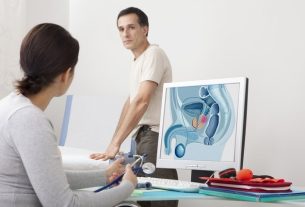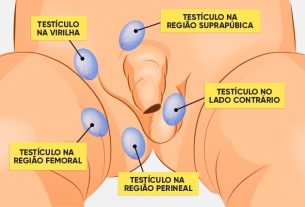Orchitis is an inflammation that can affect one or both testicles and can be caused by a blow, twisting of the testicle or a bacterial or viral infection, and is most often related to the mumps virus. Orchitis can be classified as acute or chronic according to the evolution of symptoms:
- Acute orchitisin which there is a sensation of heaviness in the testicles, in addition to pain;
- Chronic orchitiswhich is normally asymptomatic and only minor discomfort may be felt when the testicle is handled.
Therefore, if inflammation occurs in the testicles, it is important that a urologist is consulted so that an assessment can be carried out, the necessary tests can be indicated and the most appropriate treatment can be initiated.

Main symptoms
The main symptoms of orchitis are:
- Bloody ejaculation;
- Urine with blood;
- Pain and swelling in the testicles;
- Discomfort when handling the testicles;
- Feeling of heaviness in the region;
- Testicular sweating;
- Fever and malaise.
In some cases, in addition to inflammation of the testicles, there may also be inflammation of the epididymis, which is a small channel that conducts sperm for ejaculation, resulting in orchiepididymitis. Learn more about epididymitis orchiditis.
When orchitis is related to mumps, symptoms may appear 4 to 8 days after the face swells. However, the faster orchitis is identified, the greater the chances of a cure and the lower the chances of sequelae, such as infertility.
How the diagnosis is made
The diagnosis of orchitis can be made through clinical observation of the symptoms of the disease and is confirmed after carrying out tests such as a blood test and scrotal ultrasound, for example. Additionally, tests for gonorrhea and chlamydia can be useful to see if these could be the cause of the disease, as well as helping to define the best form of treatment.
Causes of orchite
Inflammation of the testicles can occur due to local trauma, testicular torsion, infection by viruses, bacteria, fungi or parasites or even by sexually transmitted microorganisms. Learn about other causes of testicular swelling.
1. Orquite viral
Viral orchitis is a complication that can occur when boys over 10 years of age and young people are infected with the mumps virus. Other viruses that can cause orchitis are: Coxsackie, Echo, Influenza and the mononucleosis virus.
2. Bacterial orchitis
Bacterial orchitis is usually associated with inflammation of the epididymis and can be caused by bacteria such as Micobacterium sp., Haemophilus sp., Treponema pallidum, Neisseria gonorrhoeae e Chlamydia trachomatis.
This disease can also be caused by bacteria that cause urinary or prostate infections, such as Escherichia coli, Klebsiella pneumoniae, Pseudomonas aeruginosa e Staphylococcus sp.
3. Fungal orchitis
Although rare, orchitis can also occur due to infection by Candida albicansespecially in immunocompromised people.
How the treatment is carried out
In the case of viral orchitis, treatment is carried out with the aim of promoting symptom relief and, therefore, the doctor may recommend the use of anti-inflammatory, antipyretic or analgesic medications. Furthermore, it is important to remain at rest, apply ice packs to the region and elevate the scrotum. In general, once treatment begins, orchitis can be resolved in approximately 10 days.
If orchitis is due to bacteria, the doctor may recommend the use of antibiotics depending on the bacteria responsible for the inflammation.
If the doctor suspects an infection with enteric bacteria, the use of ciprofloxacin, ofloxacin or levofloxacin may be indicated for 10 to 14 days. In cases where orchitis caused by a sexually transmitted bacteria is suspected, the use of ceftriaxone 250 mg in an intramuscular injection and doxycycline 100 mg twice a day for 10 to 14 days may be indicated.
Is orchitis curable?
Orchitis can be cured and normally does not leave any consequences when treated correctly. However, some possible sequelae that may occur are testicular atrophy, abscess formation, reactive hydrocele and infertility when both testicles are affected.
Bibliography
-
NATIONAL CENTER FOR BIOTECHNOLOGY INFORMATION. Orchitis. Available at: <https://www.ncbi.nlm.nih.gov/books/NBK553165/>. Accessed on 20 Jul 2022

Sign up for our newsletter and stay up to date with exclusive news
that can transform your routine!
Warning: Undefined array key "title" in /home/storelat/public_html/wp-content/plugins/link-whisper-premium/templates/frontend/related-posts.php on line 12
Warning: Undefined array key "title_tag" in /home/storelat/public_html/wp-content/plugins/link-whisper-premium/templates/frontend/related-posts.php on line 13



